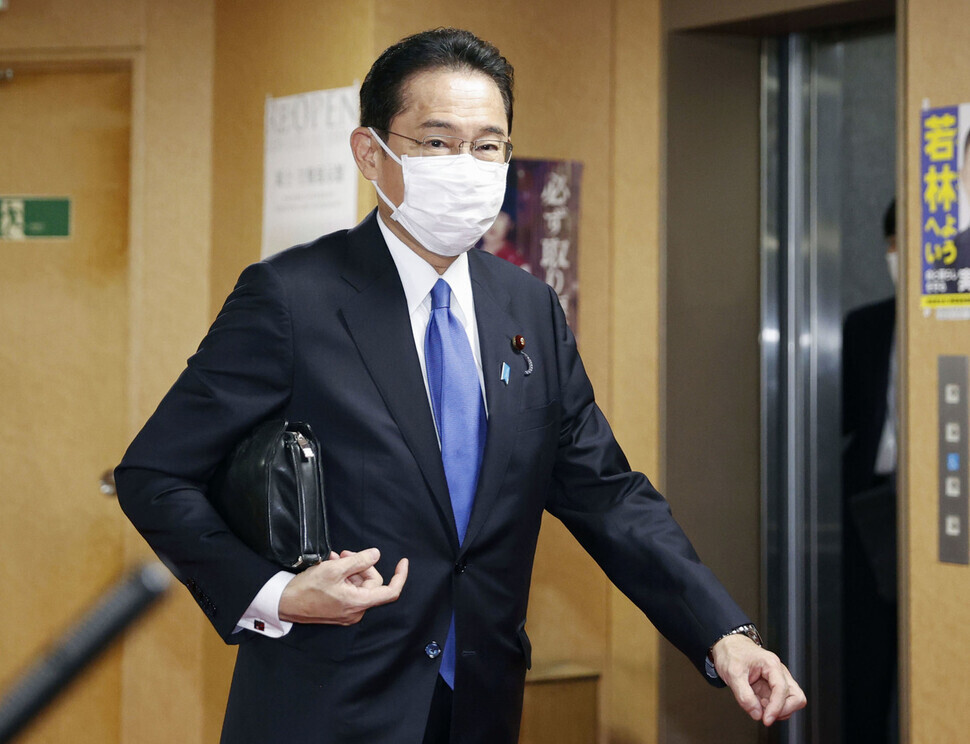hankyoreh
Links to other country sites 다른 나라 사이트 링크
[Editorial] Newly elected Japanese PM Kishida has chance to write new history with Korea — he should take it

Fumio Kishida, president of the Liberal Democratic Party (LDP), was chosen on Monday as Japan’s new prime minister. He will serve as Japan’s 100th prime minister, following the Shinzo Abe and Yoshihide Suga administrations that corresponded with the LDP’s return to power in late 2012.
The number “100” holds great symbolic value, and Kishida’s administration appears to have ambitious plans to match. Hopefully, the arrival of a new prime minister can go some way in thawing the chill in South Korea-Japan relations.
Under the Abe and Suga administrations, relations reached their lowest point since normalization.
After President Moon Jae-in effectively scrapped an agreement on the Japanese military sexual slavery survivor issue that his predecessor Park Geun-hye had reached with the Japanese government, and after the South Korean Supreme Court ruled to hold Japanese companies liable for compensation to survivors of colonial-era forced labor mobilization, Japan responded by imposing controls on exports of semiconductor and display materials to South Korea.
This approach, where Japan resorted to economic retaliation in a conflict over the resolution of historical issues, sent relations down a blind alley.
The South Korean government declared the termination of its General Security of Military Information Agreement with Japan, only to temporarily suspend the timeline of shutting it down. Sharp words have been exchanged between the two sides, and each country has seen a clear drop in its public’s favorable attitudes toward the other.
It does not seem likely that Kishida or his Cabinet will take any active steps to improve ties with Seoul in the immediate future.
Kishida was Japan’s foreign minister at the time of the “comfort women” agreement in 2015, and he has consistently maintained that South Korea “needs to abide by international agreements and law” when it comes to matters of compensation for acts committed during Japan’s colonization of Korea.
The fact that Kishida opted to keep on Toshimitsu Motegi as foreign minister and Nobuo Kishi as defense minister suggests that he intends to emphasize continuity in foreign affairs and national security policy.
But Kishida is also surely aware that continuing this cold line of relations hurts both sides. Once Japan’s general election concludes later this month, he will need to write a new history as Japan’s 100th prime minister, rather than remaining in Abe’s shadow.
South Korea and Japan have been plagued by the history of imperial Japan’s colonial activities. But even when they have clashed over historical matters, they have continued to advance their relationship, cooperating in the areas that require it. They desperately need each other today, at a time when the international order in East Asia has been shifting rapidly.
Part of the reason that the chill has not been thawed is because of Japan’s rigid insistence that it will not tolerate anything that undermines the 1965 Agreement Between Japan and the Republic of Korea Concerning the Settlement of Problems in Regard to Property and Claims and Economic Cooperation.
We look forward to Kishida taking part in unconditional dialogue as prime minister. Hopefully, it will be a very different look from Suga, who departed as prime minister having refused every last request for a meeting with the South Korean Ambassador to Japan Kang Chang-il.
Please direct questions or comments to [english@hani.co.kr]

Editorial・opinion
![[Column] The state is back — but is it in business? [Column] The state is back — but is it in business?](https://flexible.img.hani.co.kr/flexible/normal/500/300/imgdb/original/2024/0506/8217149564092725.jpg) [Column] The state is back — but is it in business?
[Column] The state is back — but is it in business?![[Column] Life on our Trisolaris [Column] Life on our Trisolaris](https://flexible.img.hani.co.kr/flexible/normal/500/300/imgdb/original/2024/0505/4817148682278544.jpg) [Column] Life on our Trisolaris
[Column] Life on our Trisolaris- [Editorial] Penalties for airing allegations against Korea’s first lady endanger free press
- [Editorial] Yoon must halt procurement of SM-3 interceptor missiles
- [Guest essay] Maybe Korea’s rapid population decline is an opportunity, not a crisis
- [Column] Can Yoon steer diplomacy with Russia, China back on track?
- [Column] Season 2 of special prosecutor probe may be coming to Korea soon
- [Column] Park Geun-hye déjà vu in Yoon Suk-yeol
- [Editorial] New weight of N. Korea’s nuclear threats makes dialogue all the more urgent
- [Guest essay] The real reason Korea’s new right wants to dub Rhee a founding father
Most viewed articles
- 160% of young Koreans see no need to have kids after marriage
- 2New sex-ed guidelines forbid teaching about homosexuality
- 3[Column] Life on our Trisolaris
- 4Presidential office warns of veto in response to opposition passing special counsel probe act
- 5How daycares became the most viable business for the self-employed
- 6Months and months of overdue wages are pushing migrant workers in Korea into debt
- 7OECD upgrades Korea’s growth forecast from 2.2% to 2.6%
- 8Hybe-Ador dispute shines light on pervasive issues behind K-pop’s tidy facade
- 9[Guest essay] Maybe Korea’s rapid population decline is an opportunity, not a crisis
- 10Another chaebol heir caught smuggling liquid marijuana into South Korea